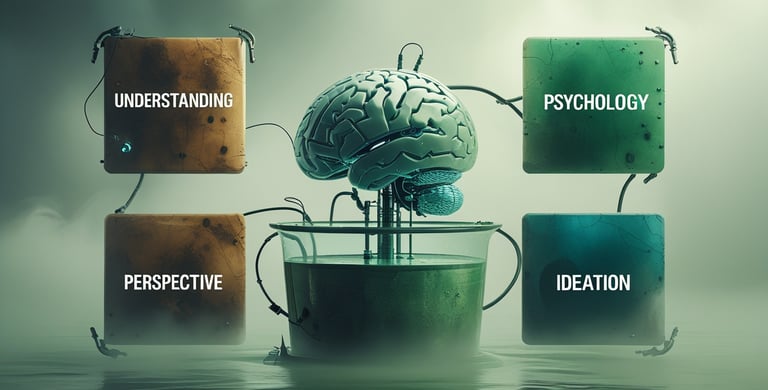Bias Detection: 7 Cognitive Biases to Watch Out for in Yourself and in Others
4FORTITUDEU - UNDERSTANDING, COGNITION, PSYCHOLOGY, PERSPECTIVE
Bias Detection: 7 Cognitive Biases to Watch Out for in Yourself and in Others
Introduction: The Invisible Hand That Shapes Your Thinking
Every man wants to see clearly, judge wisely, and lead justly. But clarity requires humility—specifically, the humility to admit that your mind is not a neutral tool. It is a biased lens, shaped by survival instincts, emotional shortcuts, and unseen assumptions. If you don’t audit your thinking, you don’t own it. This is especially vital in an age where noise, manipulation, and misinformation breed faster than truth.
Biases are not moral failures—they are mental defaults. But what you fail to detect in yourself, you will misjudge in others. This article explores seven critical cognitive biases that warp perception, sabotage relationships, and silently erode wisdom. Mastering them is not only intellectual—it’s moral.
1. Survivorship Bias: The Illusion of Obvious Success
Survivorship bias tricks us into overestimating the value of visible outcomes while ignoring the countless failures that disappeared from view. A classic example comes from WWII: engineers examined bullet holes on returning aircraft to reinforce those areas. But the real insight? Those planes survived. The fatal hits—on engines or cockpits—left no survivors to study. Thus, the absence of data was more revealing than its presence.
Modern Trap: Business gurus who made it big tell you what worked—for them. But you don’t hear from the thousands who tried the same thing and vanished. Don’t build your life by copying survivors. Study the unseen graves.
2. The Toupee Fallacy: Misjudging What You Can See
This is a specific twist on survivorship bias. People mock toupees, assuming they all look ridiculous. But that’s because the good ones aren’t noticed at all. The very success of a well-made toupee ensures its invisibility.
Deeper Insight: What you notice is often the exception. A loud child may seem like the norm until you realize five others are quietly reading. This applies to everything—political extremism, celebrity culture, social media outrage. The visible isn't always the representative.
3. Confirmation Bias: The Addictive Need to Be Right
We don’t seek truth—we seek validation. Confirmation bias drives us to read, share, and interpret information that affirms what we already believe. The result? Intellectual echo chambers and tribal warfare.
How to Catch It:
Ask yourself: What would prove me wrong?
Deliberately read views that oppose yours without mocking them.
Teach your children to question—even your beliefs.
This is a warrior’s discipline: to pursue truth even when it wounds your pride.
4. Availability Heuristic: Mistaking Frequency for Importance
We judge the probability of an event based on how easily we can recall examples. After watching news coverage of a plane crash, people fear flying—despite statistically being far safer in the air than on the highway.
How It Warps You: Emotional or recent examples hijack your reasoning. If you hear about three divorces, you may panic about your own marriage. But fear doesn’t equal fact. Clarity requires data, not just drama.
5. Fundamental Attribution Error: Judging Others by Character, Yourself by Circumstance
When others fail, we blame their character (“He’s lazy”). When we fail, we blame our situation (“I had no choice”). This asymmetry destroys empathy and moral clarity.
Reframe It: Replace accusation with curiosity. Ask: What pressures or pain shaped their actions? This doesn’t excuse evil—it restores proportion. Men of judgment must see past the surface.
6. Dunning-Kruger Effect: The Illusion of Competence
The less you know, the more confident you often are. Incompetent people overestimate their skill because they lack the knowledge to realize their ignorance. Meanwhile, true experts doubt themselves because they grasp the subject’s complexity.
Masculine Humility: Be wary of easy confidence. Ask: What do I still not know? Let your competence be measured by results, not bravado.
7. Projection Bias: Seeing Your Inner World in Others
You project your motives, fears, and logic onto others, assuming they think or feel as you do. This distorts relationships, fuels miscommunication, and fosters judgment.
Catch It in Practice:
“I wouldn’t have done that”—that’s the red flag.
Ask what assumptions you're making about their intent.
Only when you audit your lens can you clearly see the man across from you.
Final Wisdom: Know Thyself, Then Judge Justly
Bias detection is not about being clever—it’s about being clean. Your brain will lie to you. Culture will affirm those lies. And if you don’t root them out, you’ll build your entire life on a foggy foundation.
Your challenge:
Pick one of these seven biases.
Journal about where it shows up in your thinking.
Hold yourself to account, and sharpen your lens.
Because wisdom isn't inherited. It's practiced.
Fortitude Essentials – Summary for Immediate Action
Two Philosophical Takeaways:
Clear thinking is a moral duty, not just an intellectual one.
Without bias detection, truth-seeking becomes impossible.
Two Actionable Strategies:
Schedule weekly “bias audits”—reflect on judgments you’ve made.
Practice “steel manning” opposing views before dismissing them.
Expert Wisdom:
Epictetus: “It is impossible for a man to begin to learn what he thinks he already knows.”
Proverbs 18:13: “To answer before listening—that is folly and shame.”
Carl Jung: “Until you make the unconscious conscious, it will direct your life and you will call it fate.”
Socrates: “The unexamined life is not worth living.”
Disciple of Wisdom: “To judge others clearly, you must first put your own mind on trial.”
Call to Action
Join the Virtue Crusade and train your mind like you train your body. Bias doesn’t make you weak—denial does. Clean your lens. See the truth. Lead with clarity.


